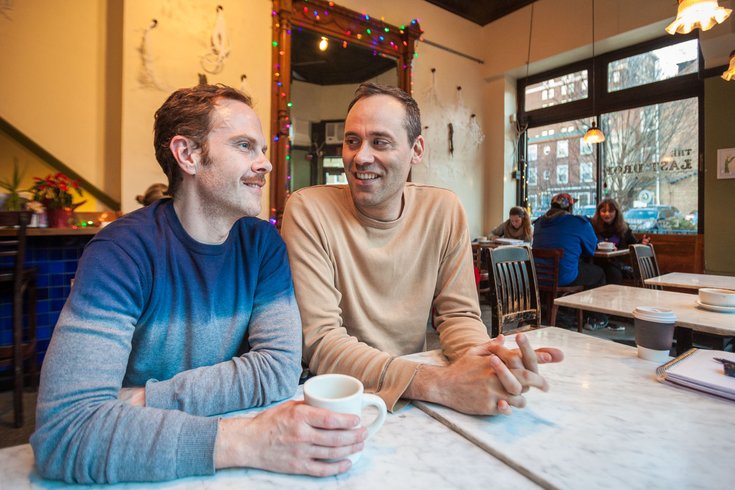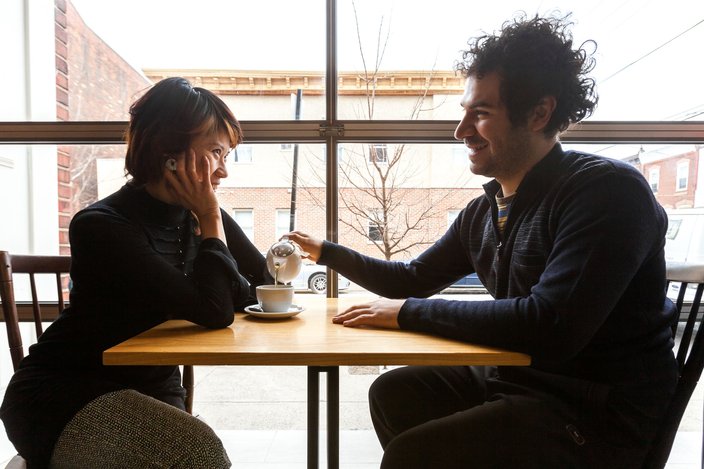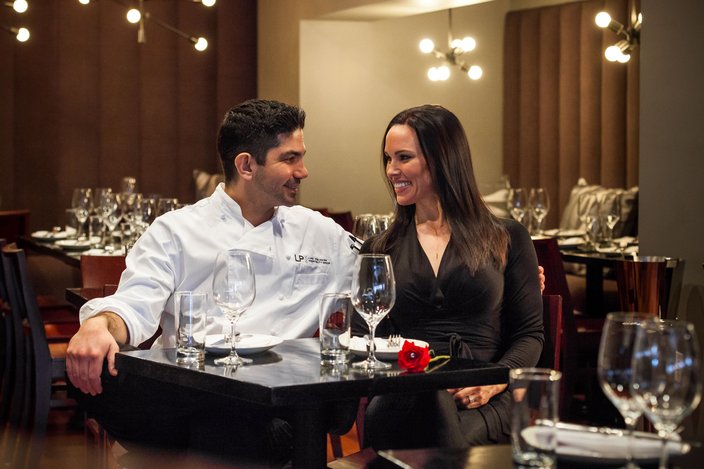
February 10, 2015
 Thom Carroll/for PhillyVoice
Thom Carroll/for PhillyVoice
Matthew Neenan (left) lounges with his partner, Dito van Reigersberg (aka, Martha Graham Cracker), at The Last Drop.
When Stevie Wonder crooned about part-time lovers, I doubt this is what he had in mind.
University of Bedfordshire research psychologist Gail Kinman conducted a 2012 study based on the hypothesis that couples who work together might have a different work-life experience than "dual-career couples," or couples who work in separate career fields. The notion was that a "work-linked" relationship (her term) could take one of two directions: It could amplify its health through shared passion or take a backseat in the shadows of the career.
Her findings appear to lie somewhere in between.
Kinman's study, originally presented at the British Psychological Society Division of Occupational Psychology Annual Conference, looked at 644 full-time academics, 45 percent of whom shared a profession with their lover; the 644 subjects were split into groups of work-linked and dual-career for the sake of drawing comparisons. Thematic consistencies were pulled from extensive interviews and organized as data into categories like "Work-Life Balance," "Work Discussion Helpfulness" and "Mutual Understanding."
The task at hand: To attach a hard science to the everyday experiences of couples who share more in common than their bedsheets.
"I have an interest in the congruence couples face and whether it pushes them together or apart," Kinman told PhillyVoice.com. "I'm quite interested in the behaviors couples engage in after the working day, and there's actually evidence that the ones who talk about their day a lot may be the ones at a greater risk."
But it's not all negative.
"There are certainly quite a few benefits to [work-linked] relationships, too," she said. "If you're going through a hard time, maybe you didn't get a part, then your partner will know what it's like to experience that situation, whereas a friend or family member might just say, 'Oh, don't worry, something else will come up!' But the risk that comes with that is the job becomes all-encompassing, and you don't talk much about anything else."
The study offers a lot to digest: For example, it found that there's a dangerous crossover of negative mood and tension when one partner has a bad day -- so, put plainly, good days are pretty good, but bad days are bad. Moreover, while a significant number of subjects reported that the content of work discussions with their partner were either "mainly negative" or equal parts negative and positive, they overwhelmingly cited their partner's input as "helpful."
The gist: Work-home boundaries among these couples can be pretty flimsy ("It's hard to have a boundary between research and cooking dinner," she says), but the mutual understanding between two people in the same field might make for a healthy payoff.
"I do think the benefits outweigh the negatives," Kinman says. "You have a high level of support, certainly, and with academics -- entertainers, even -- there is interest; there's passion and involvement there. And when a person's deeply involved in their career, they can exclude their partner. So at least if they're involved in the same thing as you, they can recognize that -- I've seen relationships fall apart because the other person just doesn't understand."
So, for the 54.6 percent of single Philadelphians out there who are (presumably) still looking, it might be worth asking: Does every Bill need a Hillary?
I took to Philadelphia's arts and food couples -- those who can arguably get the most caught up in their work -- to get the lowdown on what these relationships look like in our neck of the woods.
Meet Matthew Neenan and Dito van Reigersberg, victims of the classic awkward fix-up.
"Being with Matthew Neenan is happiness," read a note a co-worker left on van Reigersberg's desk one day in 2004. They'd previously been forced to meet in 2001 by a mutual actress friend while working together on a production of "Shut Eye" at the Wilma Theater, quickly becoming flirty with one another. But van Reigersberg says he'd been "playing the field" at the time and didn't start seriously dating Neenan until after the note from his co-worker crossed his desk.
Among other attractions, van Reigersberg was drawn in by Neenan's intuitive grasp of his daily life.
"One of the big tensions with one of the relationships I had just gotten out of was this guy, who was very much a nine-to-fiver, just didn't understand what an artist's schedule looks like," van Reigersberg told PhillyVoice.com. "And then, to meet [Matthew], it was like, 'I know what you mean when you say you're 'in tech,'' or 'I'm going to be on tour for two weeks.'"
"Like, if you have a premiere, I probably won't see you for two weeks, and I get it," chimes in Neenan.
The perk of being in the same field -- Neenan co-founded BalletX and choreographs for Pennsylvania Ballet, and van Reigersberg (aka, Martha Graham Cracker) co-founded Pig Iron Theatre -- is the readily available source of both inspiration and perspective.
"One of the big tensions with one of the relationships I had just gotten out of was this guy, who was very much a nine-to-fiver, just didn't understand what an artist's schedule looks like," van Reigersberg says. "And then, to meet [Matthew], it was like, 'I know what you mean when you say you're 'in tech,'' or 'I'm going to be on tour for two weeks.'"
"I did a piece in 2011 that was new territory for me, and I was dealing with actors and musicians and I was choreographing and almost directing a show, which I'd never done," Neenan says. "I had [Dito] come in for a few rehearsals that I knew weren't going well, and he gave me some really helpful advice."
"He went to the bathroom and cried," van Reigersberg adds, setting the record straight.
Neenan also adds that his entire Rufus Wainwright production, "11:11," was inspired by his relationship with van Reigersberg; van Reigersberg, meanwhile, says Neenan has a knack for the kind of harsh truths that allow him to pick the right numbers to perform.
The trick to a relationship of the work-linked variety, they agree, is to not take career obligations personally. While they try to keep track of each other's calendar, they understand that, in their careers as touring artists, being away is a fact of life -- it's non-negotiable. And when they are in Philly together, they find a middle ground: They get dinner about twice a week, watch television together ("He always falls asleep, though," groans Neenan) and allow each other space to work independently when they happen to be working from home. And while they emphasize that it's not "all roses and chocolate," it does come down to understanding their needs and recognizing each other's independence.
"It's about not putting pressure on a person," Neenan says, "especially when they're going through an intense artistic period."

Eun Jung Choi and her husband, Guillermo Ortega Tanus, chat over morning tea at Ultimo Coffee. / Thom Carroll, staff photographer for PhillyVoice.com
Guillermo Ortega Tanus was Eun Jung Choi's student long before he was her husband.
Let's back up for a moment: Jung Choi, who now co-owns Philly-based dance company Da Da Dance Project with Tanus, had been asked to head a two-week dance workshop in Mexico City in 2006; Tanus, a dancer, discovered the workshop online and was instantly sold -- not because of the workshop itself but because of Jung Choi's bio.
Next thing they knew, after a week of class, Tanus was playing hookie to hang out with his titular mentor at a coffee shop. But instead of discussing dance (or, you know, class), they found themselves discussing the usual first-date topics: Life paths, past relationships, their work passions, etc.
Eventually, Tanus turned down an opportunity to co-found a dance company in Mexico and instead sold his motorcycle and started teaching Pilates classes so he could afford to trek it to New York, where Jung Choi lived at the time. Once he came, he never went back.
Still, despite all the zsa zsa zsu, they forthcomingly explain that, once they formed their dance company together in 2008, their relationship started to endure its fair share of rocky moments.
"It's hard to separate the [work and personal] sometimes," Tanus told PhillyVoice.com. "I'd be thinking about the relationship [at work], and she'd be like, 'No, no -- this is work!' And I would feel like she changed or was cold or something like that."
To help with that, they said they constantly bring in third-party artists to help with their productions to "moderate" their working relationship -- "Because sometimes," Jung Choi told PhillyVoice.com, "there's a lot of personal stuff going on, and the separation of work and personal space gets harder and harder."
There's also jealousy, which isn't overwhelming for the couple but is sometimes difficult for Tanus to grapple with. He is -- aside from being younger -- not from the United States and lacks the robust network Jung Choi's accumulated since immigrating here from South Korea in 1991.
"It's hard, because she's been in the area for a longer time than me," he says. "She's more recognized than I am, so that can be hard, because you always have that comparison right in front of you."
It can, imaginably, take a toll.
"It's hard to separate the [work and personal] sometimes," Tanus says. "I'd be thinking about the relationship [at work], and she'd be like, 'No, no -- this is work!' And I would feel like she changed or was cold or something like that."
"We spend so much time together, and in that way, we're lucky and unlucky, because most couples go to their jobs and then meet and talk about it and do something fun; not so much for us, because we work together, too, so we work in the same place and on the same project or even give each other jobs," Tanus says. "It's a little saturating at times, but I will also say that our relationship has much more life, or longevity, just because it feels like I've been with her for a longer time than we actually have been."
The creative advantages to be gleaned (like Jung Choi re-discovering her sense of humor, she says) also don't count as a clear-cut "win."
"Usually, when there's a project, [artists have] a piling up of ideas, and we hold them and talk about them in a rehearsal space. But we talk about it 24 hours as a couple," Jung Choi says. "It's different than working with someone else, because you might have an idea and hold it, and it goes away and filters through and then you go in and talk about it, but with him, it's just continuous."
"Sometimes," she adds, "our brains just don't get a rest."

Luke Palladino and his fiancee, Kristine Kurilko, relax before preparing for the dinner rush at Palladino's. / Thom Carroll, staff photographer for PhillyVoice.com
Count Luke Palladino and his fiancee Kristine Kurilko among the more unusual of the work-linked couples: Kurilko doesn't actually cook with her hubby-to-be, but she does work with him on the daily to sell his cooking.
Kurilko says she and Palladino first met when he "ran me over with a porchetta" in 2012. She was dining with friends at his Harrah's Atlantic City Luke Palladino restaurant (since closed) and couldn't help but notice Palladino had taken the long and narrow route with his cart of pork.
"I didn't have the nerve to talk to her, so I just, you know, ran her over with a pork roast," Palladino says with a nonchalant shrug.
Palladino eventually took the gentleman's route and called her; they went on a date to Harry's Oyster Bar in Atlantic City and began spending more time together. Without realizing it, she began regularly offering advice on how to package and market his food, and Palladino eventually woke up to the opportunity staring him in the face.
"I started dumping more and more of the marketing end on her, and so now she's in charge of all the branding," Palladino says. "She's the soundboard for all of my ideas. I throw things at her all day long, and she helps package it to make it make sense."
When I ask for an example of a project he wouldn't have launched without her, he's quick to answer.
"This," he says, eyeballs scanning the Palladino's on Passyunk dining room.
"There were times I wasn't sure, I wasn't convinced, and I can be emotional sometimes and poo-poo things and ideas and dismiss things, and she's calm and business-savvy -- 'Look at it this way,' she'll say," Palladino says.
"I'm much more pragmatic. He's the Italian hot-head," she says, laughing.
Career-wise, she's Robin to his Batman -- by her own admission.
"The best part of working together is, when I did my other [marketing] job, I was traveling across the country; it was grueling. I was constantly on an airplane, at a high stress level, and between his demanding job and my demanding job, I don't know if it would have worked out so great," Kurilko says. "So, for me to be able to take a more supportive role to him, I think, is perfect."
Their work-life balance is this: She does the cooking at home (because what chef wants to cook after an all-night shift?), and no one is allowed to talk about business after a certain hour. Boundaries are clear.
"Sometimes when we do see each other at night -- which is rare now -- we just have to turn off the business. 'Let's not talk about business, because that's all we talk about,'" Palladino says. "We might want to shut it down and talk about each other, the kids or something else until we fall asleep."
They're also sure to spend plenty of time apart but are hesitant to say their working relationship is much of a burden. It's actually, they suggest, a great uniter.
"I think everyone, in a relationship, needs to have their own independence and their own interests and friends," Kurilko says. "But I think when you have something to bond over, a common project or goal, it's something you can both work for."
In their case, there's also an understanding of what comes after work.
"I know what she needs in her schedule, and it allows for more of a balance in her life," Palladino says. "We have three kids, so we have a lot of activity. She manages everything, and I know I don't have to worry about anything at home, so I just have to worry about the business, which makes it easier on me."
He adds, emphasizing the point: "There's a lot of understanding and respect here."
Look, love is hard -- period. It doesn't come with a manual; there are no do-overs; and it's not exactly Hershey Park, with a set track and a guaranteed Kiss at the end of the ride. Adding a shared work life in the mix just further complicates an already extraordinarily complicated subject.
But, low and behold, Philadelphians -- fierce and determined as ever -- find a way to make it work. Because in the end, love is all you need.